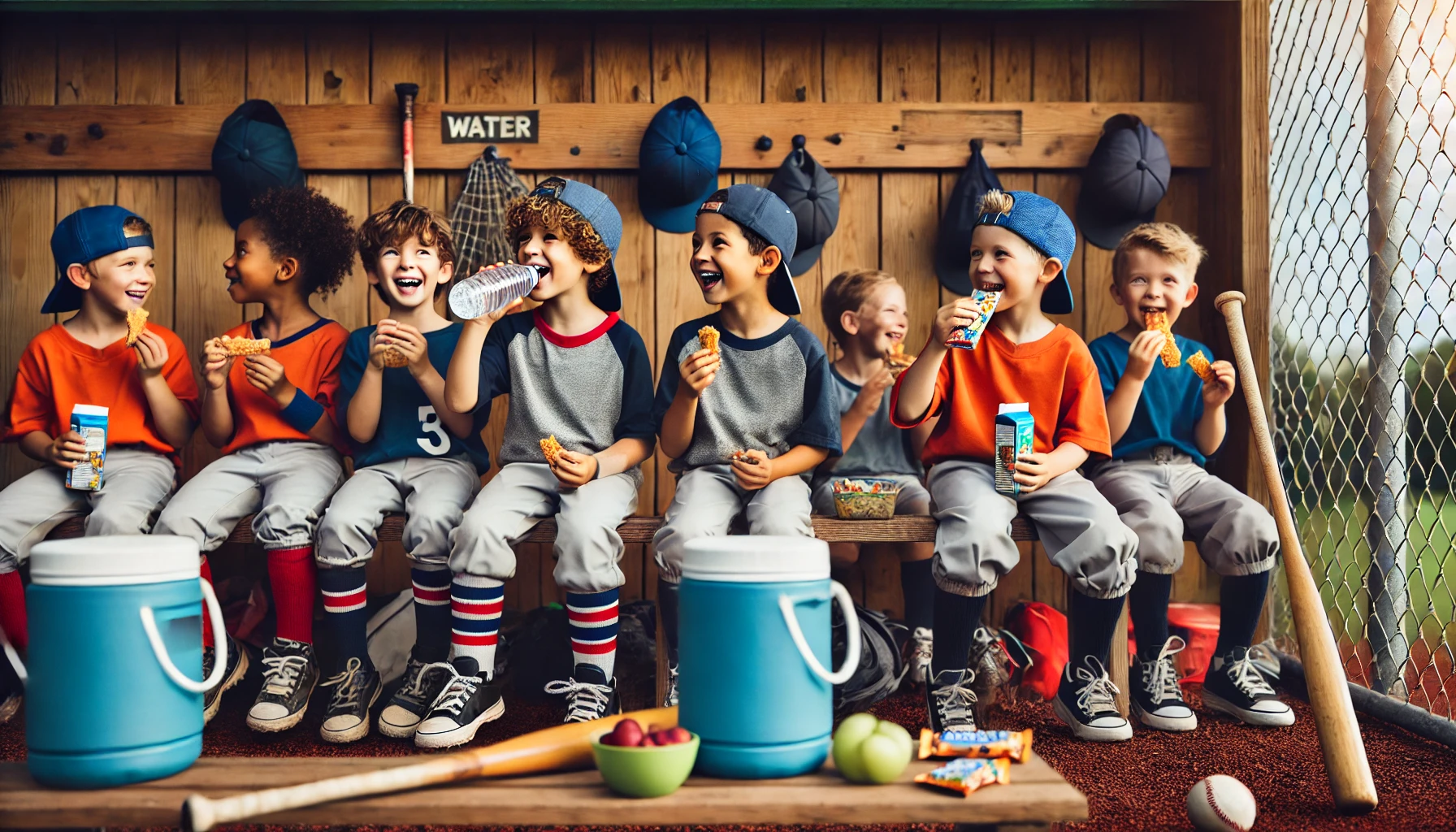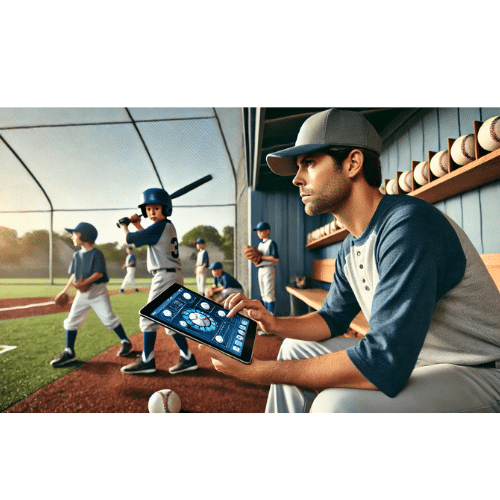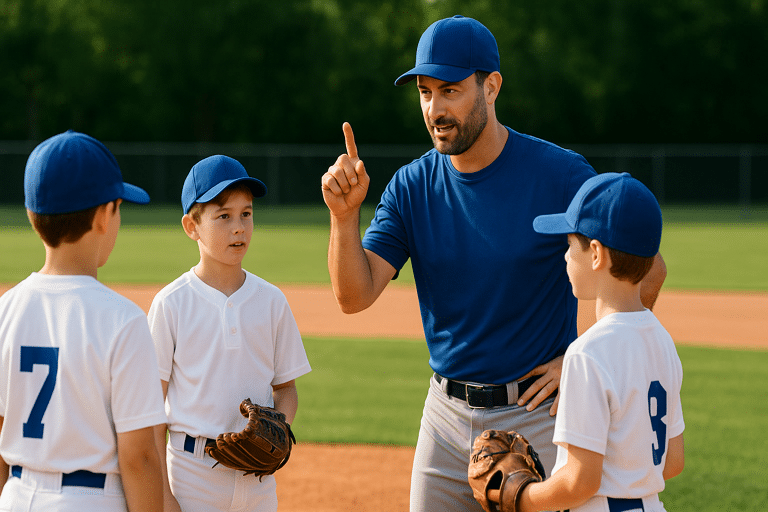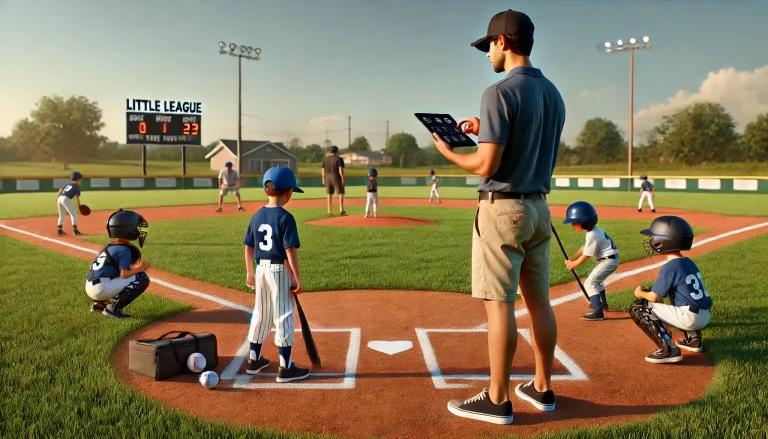Proper nutrition is essential for young athletes! For Little League coaches, understanding sports nutrition isn’t just about game-day energy—it’s about building healthy habits that last a lifetime.
The challenge? Young athletes have unique nutritional needs that differ from those of adults and non-athletic kids.
Their performance, stamina, and recovery can all take a hit without proper fuel.
Ready to discover how smart nutrition strategies can elevate your team’s game? Let’s discuss some essential nutrition tips every baseball coach should know!
Nutrition Tips for Young Athletes
Understanding Youth Athletes’ Nutritional Needs
Their growing bodies require specific nutrients in the right amounts, which can mean the difference between thriving on the field and struggling to keep up.
While adult players focus on performance nutrition, young athletes must prioritize athletic performance and proper growth. Growing bones need more calcium (1,300 mg daily for teens), developing muscles require adequate protein (0.6–0.8 grams per pound of body weight), and iron is vital for oxygen transport—especially for young female athletes.
Meanwhile, complex carbohydrates should make up 50–55% of their daily calories to fuel energy needs during practices and games.
Energy Demands:
Youth baseball players often need 2,000–4,000 calories daily, depending on age, size, and activity.
A 12-year-old in peak training might require nearly double the calories of their less active peers.
However, these calories must come from nutrient-dense foods—not sugary drinks or processed snacks.
Recovery Nutrition:
Unlike adults who turn to protein shakes, young athletes can recover effectively with whole foods.
Chocolate milk, for example, provides an ideal mix of carbs and protein while appealing to kids’ taste buds.
Growth Spurts and Adjustments:
During growth spurts, calorie and nutrient needs can spike up to 500 calories daily.
Coaches and parents should adjust portions and meal timing accordingly, and consulting a sports nutritionist can help tailor plans to individual growth and activity levels.
On-Field Impact:
Proper nutrition improves endurance, focus, and recovery, reducing injury risks, especially during demanding schedules like double-headers.
Hydration is equally important—kids should drink 4–8 ounces of water every 15–20 minutes during activity.
- Building good nutritional habits early helps young athletes succeed in baseball and life. These foundational habits can last well into adulthood, making nutrition education as important as perfecting a batting stance.
Pre-Game and Practice Nutrition Strategies
Timing is vital for pre-game nutrition. The goal is to fuel up without upsetting the stomach.
The general rule is to eat a larger meal 3–4 hours before game time to allow for proper digestion.
For a typical 6 PM game, aim for a substantial lunch around 2–2:30 PM. A balanced plate might include:
- Lean protein (grilled chicken)
- Complex carbs (brown rice or sweet potatoes)
- Vegetables (easy-to-digest, like steamed broccoli)
For early morning games, go lighter. A small breakfast 2 hours before the game is ideal. Consider:
- Whole-grain toast with peanut butter and banana
- Oatmeal with fruit and a little protein
Avoid heavy, greasy foods, which take longer to digest and can make players feel sluggish.
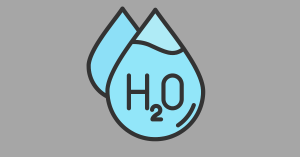
Hydration Tips
Hydration starts the day before the game. Players should aim for light yellow urine as an indicator of good hydration. On game day:
- 2–3 hours before: Drink 16–20 ounces of water
- 10–15 minutes before: Drink 8–10 ounces to top off
- During the game: Sip water every 15–20 minutes to stay hydrated
Pre-Game Snack Ideas
For quick energy boosts, try these snacks:
- Apple slices with string cheese (45 minutes before)
- Half a turkey sandwich on whole-grain bread (1 hour before)
- Banana with a handful of almonds (30 minutes before)
- Low-fat granola bar with dried fruit (30–45 minutes before)
Avoid high-fat foods (like pizza and burgers), sugary snacks, and anything spicy or unfamiliar.
Weather and Tournament Days
On hot days, focus on extra fluids and lighter meals. For cold weather, slightly more calories might be necessary.
During double-headers or tournaments, keep meals light and easy to digest between games—think pretzels, graham crackers, or sliced oranges.

In the Dugout
Dugout water breaks are essential.
Thirst signals dehydration, so encourage small sips regularly. It’s also smart to keep emergency snacks in the dugout for an energy boost when needed.
Good nutrition timing can be a game-changer, whether it’s a sweltering afternoon or a cool evening game.
Stick to these strategies to help players feel their best on the field and beyond.
Nutrition Tips for Young Athletes
Nutrition And Hydration During Game
Baseball presents unique hydration challenges compared to other youth sports.
Unlike basketball, where players have frequent water breaks during natural stoppages, baseball players can be on the field for long stretches, making it critical for coaches and parents to recognize the early warning signs of dehydration.

Dehydration is sometimes apparent, but there are critical indicators to watch for. Dark urine, decreased performance, fatigue, headaches, and muscle cramps are all red flags that demand immediate attention.
A simple test is if players pinch their skin and it stays “tented” rather than snapping back quickly. They’re likely dehydrated.
Many coaches find it surprising that thirst isn’t a reliable indicator of hydration needs. When players feel thirsty, they’ve already lost 1-2% of their body weight in fluid—enough to affect performance.
This is why scheduled water breaks between innings are more effective than waiting for players to ask for water.
The key to sports drinks is knowing when they’re necessary.
Water is sufficient for games lasting less than 60 minutes in moderate temperatures.
Still, during tournaments, double-headers, or hot-weather games (above 80°F), sports drinks help replenish the electrolytes lost through sweat.
Look for drinks with a 6-8% carbohydrate concentration—anything higher can cause stomach discomfort.
Dugout snacking also plays a vital role in keeping energy levels up. The best options include:

- Orange slices (natural sugars and hydration)
- Banana halves (help prevent cramping)
- Small pretzels (replace salt lost through sweat)
- Graham crackers (quick energy without heaviness)
- Watermelon chunks (Hydration plus natural sugars)
In hot weather, hydration schedules become even more critical. Players should aim to drink 4-6 ounces of fluid every 15 minutes during activity in the heat.
Coaches should enforce mandatory water breaks, even if they briefly delay the game. Hydration between innings is particularly critical during summer tournaments.
Players should take small sips (about 2-3 ounces) of water between innings, avoiding large gulps that can cause discomfort while ensuring steady hydration.
Temperature plays a significant role in fluid needs.
On a 90°F day, players may need twice as much fluid as on a 70°F day.
Humidity worsens matters—when sweat doesn’t evaporate efficiently, the body struggles to cool down, increasing fluid demands even more.
Watch for common mistakes, such as players sharing water bottles (which can spread illness) or leaving water jugs in direct sunlight (which can lead to bacterial growth).
Each player should have a personal, labeled water bottle, and team water supplies should be kept in shaded areas.
For marathon tournament days, alternate between water and sports drinks to maintain hydration and electrolyte balance.
Players should drink water during one game and switch to a sports drink during the next, especially if multiple games are played in hot conditions.
This strategy helps prevent dehydration and electrolyte imbalances, which can cause cramping.
- Remember: recovery begins during the game. Proper hydration throughout play minimizes catch-up work afterward and improves performance in future games.
- Young athletes who stay hydrated tend to focus and play better—especially in the late innings when games are often decided.
Nutrition Tips for Young Athletes
Post-Game Recovery Nutrition
The first 30 minutes after a baseball game are crucial for recovery. During this window, muscles are primed to replenish energy and repair damage.
While missing it won’t ruin recovery, it can delay how quickly players feel ready for the next game or practice.
Recovery Essentials
Chocolate milk is a top recovery drink for youth athletes. With its 3:1 carbohydrate-to-protein ratio, it provides the nutrients tired muscles need.
It’s also a kid-friendly alternative to protein shakes. An 8-ounce serving usually delivers just the right balance for young players.
Recovery needs depend on game intensity and conditions.
A catcher who caught six innings in 90-degree heat will need more refueling than a player rotating through a few innings in mild weather.
A general guideline is consuming 0.5 grams of carbohydrates per pound of body weight within 30 minutes after intense activity.
Post-Game Meal Ideas
Effective recovery meals combine protein and carbs:
- Turkey and cheese on whole-grain bread with fruit
- Grilled chicken wrap with veggies and hummus
- Pasta with lean meat sauce and a side salad
- Rice bowls with beans, lean protein, and vegetables
For tournament play, quick, digestible options like a peanut butter and jelly sandwich with a banana work well for between-game energy.
Travel-Friendly Recovery Snacks
Pack snacks that don’t require refrigeration:
- Trail mix with dried fruit and nuts
- Whole-grain crackers with peanut butter
- Granola bars with 5+ grams of protein
- Fresh fruit paired with nuts or seeds
Protein and Hydration Needs
Young athletes typically need 0.6-0.8 grams of protein per pound of body weight daily. After a game, aim for 15-20 grams of protein within the recovery window.
Hydration also matters—replenish electrolytes with sports drinks initially, then turn to foods like bananas (potassium), salted nuts (sodium), or yogurt (calcium).

Hot Weather Games
In the heat, players may lose their appetite, but recovery is even more critical. Cold fruit smoothies with yogurt are ideal for cooling down and replenishing nutrients.
Avoiding Common Mistakes
Skipping post-game nutrition or relying on processed snacks can hinder recovery.
Light options like string cheese with whole-grain crackers or a small turkey wrap can do the trick even after a late game.
Building Recovery Habits
- Teaching young players why recovery matters fosters lifelong healthy habits.
- Understanding the “why” behind nutrition helps them make smart choices—even when no one’s guiding them.
Nutrition Tips for Young Athletes
Season-Long Nutrition Planning
Planning team nutrition for an entire season requires the precision of a perfect double play.
A well-organized strategy helps players stay fueled and strong, even during late or extra innings.
Here’s how to build a winning nutrition plan that supports your team all season.
Creating Team Nutrition Guidelines
Start strong by setting clear nutrition expectations at the beginning of the season.
Distribute simple, actionable handouts during the parent meeting that outline:
- Game-day eating schedules
- Snack policies
- Meal and snack recommendations
Addressing Dietary Restrictions and Allergies
Food allergies are a serious concern in youth sports, with peanut allergies alone affecting about 2% of children. Implement a “nut-free dugout” policy to ensure safety and avoid emergencies.
- Maintain a detailed team roster of allergies and dietary restrictions.
- Share this information with parents and coaches.
- Train coaches and volunteers to handle food allergy emergencies.
Tournament and Travel Game Planning
Tournament nutrition requires careful coordination. Two weeks before an event, share a meal guide with parents, including:
- Portable snack options
- Game-time meal suggestions
- Cooler-packing tips
- Local restaurant recommendations
- Hydration schedules based on the weather forecast
For travel games, assemble a “travel nutrition kit” with snacks that meet dietary needs. Coaches should carry backup options to ensure every player goes with proper fuel.
Managing Team Snack Schedules
Set a structured schedule to avoid snack chaos. Provide parents with approved snacks that meet nutrition and safety standards.
Rotate snack duties among families to ensure fairness and prevent performance-derailing choices like sugary treats.
Hot Weather Tournaments
Playing in extreme heat adds unique challenges. Prepare your team with these essentials:
- Individual water bottles for every player
- Team water coolers stored in shaded areas
- Electrolyte drinks for long games
- Cooling snacks like frozen grapes or chilled orange slices
Parent Education
Educating parents is just as important as educating players. Go beyond basic nutrition guidelines by offering resources on:
- Portion sizes
- Meal timing
- Signs of dehydration
Consider hosting a pre-season workshop with a sports nutritionist to give parents the tools to effectively support their young athletes.
The Role of the Team Snack Coordinator
Appoint a team snack coordinator to manage the schedule, oversee allergy restrictions, and coordinate nutrition needs for tournaments and travel games. This volunteer ensures consistency and simplifies communication throughout the season.
Flexibility and Communication
Even the best-laid plans can be disrupted by weather, delays, or unexpected changes. Build flexibility into your strategy by:
- Keeping backup snacks and hydration supplies on hand
- Communicating adjustments clearly with parents and players
With thoughtful planning and open communication, your team will be prepared to overcome any challenges that arise, fueling success all season long.
Special Considerations and Challenges
Youth baseball brings unique nutrition challenges, especially during double-headers and tournament weekends. Strategic planning and smart choices can help players maintain energy, recover effectively, and perform their best.
Double-Headers: Timing is Everything
The hour between games is a critical refueling window. Heavy meals or greasy concession stand foods can weigh players down. Instead, prioritize:
- Easily digestible carbs like pretzels or apple slices
- Moderate protein from options like string cheese or turkey sandwiches
Proven snack ideas:
- Half a turkey sandwich
- Graham crackers with peanut butter
- Apple slices with hummus
- Sports drinks diluted with water
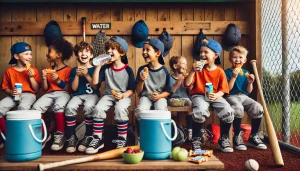
Tournament Weekends: Small Meals, Big Impact
Steady energy is vital, with three to four games daily and minimal breaks.
Replace large meals with small, 200-300 calorie snacks every 2-3 hours, focusing on foods that sustain energy:
- Trail mix
- Bananas
- Seasonal fruits
- Peanut butter on whole-grain bread
Picky Eaters: Creative Solutions
Not every player loves traditional healthy foods. Get creative with alternatives:
- Replace bananas with frozen grapes
- Offer chilled smoothies or fruit cups
The goal? Find nutritious options players will actually eat.
Food Allergies: Safety First
With nearly 8% of children affected by food allergies, preparation is crucial. Create a team allergy protocol:
- Maintain a detailed list of allergies.
- Post allergy alerts in dugouts
- Designate allergy-safe eating zones.
- Train coaches on emergency epinephrine use
- Ensure players wash their hands after eating.
Budget-Friendly Nutrition
Proper fueling doesn’t have to break the bank. Budget-friendly options include:
- Bananas (25 cents each)
- Bulk trail mix ingredients
- Peanut butter sandwiches
- Store-brand chocolate milk
- Seasonal fruits
Hot Weather Challenges: Keep It Cool
In extreme heat, appetite loss can derail performance. Focus on cool, hydrating foods:
- Frozen fruit chunks
- Cold pasta salad
- Protein smoothies
- Melon and cucumber slices
- Chilled sandwich quarters
Weekend Prep: Simplify Success
Poor planning often causes more issues than picky eating. Create a weekend routine to streamline preparation:
- Wash and portion fruit.
- Bag trail mix in advance
- Freeze water bottles for hydration.
- Pack coolers the night before
Food Safety: Stay Vigilant
Keep team snacks safe, especially during hot tournaments:
- Store cold foods at proper temperatures.
- Avoid mayo-based dishes
- Use separate coolers for food and drinks.
- Regularly replace ice
- Check snack expiration dates.
Smart Bulk Shopping
Team parents can save money by coordinating bulk purchases:
- Sports drink powder
- Granola bars
- Fresh seasonal fruits
- Trail mix ingredients
- Sandwich supplies
- With thoughtful planning and accessible whole-food options, every young athlete can enjoy the benefits of proper nutrition. Make fueling fun, safe, and inclusive for all!
Nutrition Tips for Young Athletes

Conclusion:
Fueling young athletes with proper nutrition is critical for performance and long-term development.
By following smart nutrition strategies, coaches can help players stay energized, recover faster, and build healthy habits that last a lifetime.
From pre-game meals to post-game recovery foods, share these actionable tips with parents and players to create a team environment that prioritizes proper fueling.
Teach young athletes about meal planning for baseball tournaments, the importance of hydration, and how nutrient timing can elevate their game.
Simple changes like offering healthy snacks for players and designing a game-day eating schedule can make all the difference in their performance on and off the field.
Making sports nutrition education part of the game plan will empower every athlete to reach their full potential.
Together, we can turn team snack time into an opportunity to boost performance, build resilience, and keep young athletes at the top of their game.
Frequently Asked Questions About Youth Baseball Nutrition
Q: How long before a game should my player eat their last meal? A: A larger meal should be eaten 3-4 hours before game time. A light snack can be consumed 30-60 minutes before the game.
For example, if it’s a 6 PM game, eat lunch around 2-2:30 PM, with a small snack like a banana at 5 PM if needed.
Q: Are sports drinks necessary for regular games? A: Water is sufficient for games under 60 minutes in moderate temperatures. Sports drinks become beneficial during tournaments, double-headers, or when playing in temperatures above 80°F.
Choose drinks with 6-8% carbohydrate concentration for optimal absorption.
Q: What’s the best post-game recovery snack? A: Chocolate milk provides an ideal ratio of carbohydrates to protein (3:1) and is well-liked by most players.
Other good options include a peanut butter sandwich with banana or string cheese with apple slices.
Aim to consume something within 30 minutes after the game.
Q: How can I tell if my player is appropriately hydrated? A: Check urine color—it should be light yellow, similar to lemonade. Dark urine indicates dehydration.
Players should also urinate regularly throughout the day and drink 4-8 ounces of water during games every 15-20 minutes.
Q: Should young players use protein supplements? A: Most young athletes can meet their protein needs through whole foods.
A balanced diet, including lean meats, dairy, eggs, and plant-based proteins, provides sufficient protein for growth and recovery.
Supplements are rarely necessary and should only be used under professional guidance.
Q: What should players eat during tournaments with multiple games? A: Focus on easily digestible foods between games:
- Small turkey or peanut butter sandwiches
- Fresh fruit with string cheese
- Trail mix (if no nut allergies exist)
- Granola bars with moderate protein
- Pretzels or crackers with hummus
Q: How do I handle snacks for team members with food allergies present? A: Create a team allergy list and distribute it to all parents. Stick to simple, allergy-friendly snacks like:
- Fresh fruit
- Rice-based crackers
- Popcorn
- Fruit snacks
- Vegetable sticks
Q: What’s the best breakfast before an early morning game? A: Eat a light, carbohydrate-rich breakfast 2 hours before game time. Good options include:
- Oatmeal with fruit
- Toast with peanut butter and banana
- Small bagel with light cream cheese
- Cereal with low-fat milk Avoid heavy, greasy foods like bacon or sausage.
Q: Should players eat during a game? A: Eating during play is optional for regular games under 2 hours if proper pre-game nutrition is followed. Small snacks between innings can help maintain energy for longer tournaments or double-headers—think orange slices or a few pretzels.
Q: What’s the most budget-friendly way to meet nutrition needs? A: Focus on whole foods and bulk shopping:
- Buy seasonal fruits in bulk
- Purchase store-brand products
- Prepare snacks at home instead of pre-packaged options
- Share bulk purchases with other team families
- Pack water from home instead of buying bottles
Remember: These guidelines should be adjusted based on individual player needs, weather conditions, and game schedules. Consult with a healthcare provider or sports nutritionist for personalized advice when in doubt.
